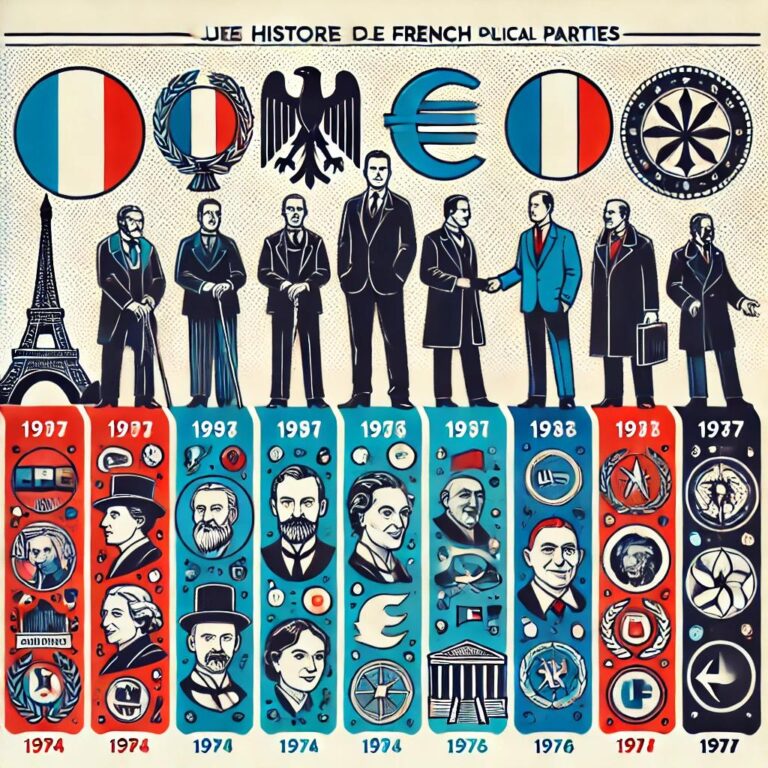
The Inception of Front National and the Role of Jean-Marie Le Pen
The Front National (FN) was founded in 1972 amidst a tumultuous socio-political landscape in France that was characterized by significant social unrest, economic crises, and the gradual decline of traditional political parties. These conditions created an environment ripe for the emergence of new political movements. Jean-Marie Le Pen, a former paratrooper and a seasoned politician, was instrumental in the establishment of the FN. His vision revolved around fostering a nationalist sentiment and addressing concerns about immigration, national identity, and law and order, which increasingly resonated with segments of the French populace.
Le Pen’s strategy involved positioning the FN as a far-right party, distinct from mainstream political entities. He capitalized on growing discontent among voters who felt marginalized by the establishment, thus presenting the FN as a legitimate alternative. By skillfully tapping into prevailing sentiments of disillusionment, Le Pen sought to galvanize support for the party, promoting an agenda that emphasized patriotism and protectionism. The FN’s founding marked a pivotal moment in French politics, as it challenged the traditional left-right dichotomy with its radical perspectives on societal issues.
Initial reactions to the Front National were mixed. While some segments of the population embraced its messages, others vehemently opposed it, viewing the party’s positions as extremist. Key events during the early years of the FN, such as subsequent local elections, gradually established its foothold within the political landscape. Le Pen emerged as a polarizing figure, garnering media attention and catalyzing debates regarding nationalism. His influence was not limited to the FN but extended to shaping discourse in broader political arenas. It is essential to recognize that the groundwork laid during this period would significantly influence the FN’s future trajectory and its evolution in the years to come.
Controversies and Political Influence of Jean-Marie Le Pen
Jean-Marie Le Pen, the co-founder and long-time leader of France’s National Front (FN), has been a polarizing figure in French and European politics. Throughout his political career, he has been embroiled in numerous controversies, many of which have centered around his provocative statements and positions on immigration, national identity, and law and order. His outspoken rhetoric has often drawn allegations of hate speech, prompting legal challenges that further fueled public debate about his political legitimacy.
One of the most notable incidents occurred in 1987, when Le Pen famously described the Holocaust as a “simplification of history.” This remark led to significant backlash and legal ramifications, including a conviction for inciting hatred. Such controversies not only solidified his position as a divisive figure but also sparked broader discussions about the limits of free speech in political discourse. Each provocative statement seemed to resonate with a particular voter base while alienating others, creating a tumultuous relationship with the French public.
Under his leadership, the FN experienced a significant transformation, transitioning from a fringe group to a substantial force in French politics, especially evident in the elections of the 1990s and early 2000s. His influence extended beyond the party, reshaping national conversations regarding immigration and French identity, thereby embedding these topics into the mainstream political landscape. This shift allowed the FN to gain traction among voters disenchanted with traditional parties, leveraging discontent over economic and social issues.
However, Le Pen’s authoritative and controversial leadership style often polarized voters and framed the FN’s identity. Critics assert that his unapologetic approach entrenched a perception of the party as extremist, which both benefited and handicapped its electoral prospects. Consequently, while he contributed significantly to elevating the FN’s profile, his contentious methods have cast a long shadow over its image and future viability. Understanding the complexities of Le Pen’s controversies and political influence is essential to grasp the nuanced evolution of the FN in the broader political context of France.
Transition to Rassemblement National and Marine Le Pen’s Leadership
The transformation of France’s Front National (FN) into Rassemblement National (RN) marks a significant turning point in the party’s history, largely driven by the vision and leadership of Marine Le Pen. Upon taking over the reins of the party from her father, Jean-Marie Le Pen, in 2011, Marine Le Pen recognized the urgent need to detoxify the party’s image, which had long been marred by accusations of racism and xenophobia. The rebranding to Rassemblement National was not merely cosmetic; it was a strategic overhaul aimed at broadening the party’s appeal across the French electorate.
Marine Le Pen’s approach diverged from her father’s by emphasizing a more inclusive rhetoric that sought to attract voters disillusioned by traditional political parties. This involved shifting focus from issues that alienated potential supporters, such as overtly nationalist sentiments, to more relatable concerns, including economic hardship, security, and immigration policy. Under her leadership, RN adopted a platform that sought to address the everyday concerns of French citizens while maintaining its core principles. This blend of populism and national sovereignty enabled the party to gain traction among various demographic groups.
The party’s electoral strategies evolved as well, with targeted campaigns and a strong presence on social media platforms that resonated with younger voters. RN’s performance in recent elections has been indicative of its growing influence, securing a substantial percentage of votes, especially in the European Parliament and local elections. Looking ahead to January 2025, Marine Le Pen and her team are continuing to refine their policies and strategies, aiming to solidify their position in the French political landscape. The ongoing challenge for RN is not only to maintain momentum but also to navigate the complexities of a rapidly changing political environment, as it strives for greater legitimacy on the national stage.
The Legacy of Jean-Marie Le Pen and Recent Developments Post-Passing
Jean-Marie Le Pen, a significant figure in French politics, passed away on January 7, 2025. His death marked a pivotal moment for the Front National (FN), now known as Rassemblement National (RN), which he co-founded in 1972. Le Pen’s controversial views and staunch nationalism left an indelible mark on the French political landscape, shaping the party’s identity and influencing broader discussions on immigration, national identity, and economic sovereignty. As the party navigates this transition, it is crucial to consider both its reaction to his passing and the challenges that lie ahead.
In the wake of Le Pen’s death, political analysts and figures have offered mixed reactions. While some acknowledge his contributions to elevating nationalist sentiments in France, others have pointed to the divisive and often provocative nature of his rhetoric. The media response has echoed these sentiments, delving into his complex legacy and questioning the future of the RN in the post-Le Pen era. Critics argue that his passing represents a turning point that may lead the party away from extremism, while supporters emphasize the foundational principles he established.
Marine Le Pen, his daughter and current leader of the RN, faces the task of maintaining the party’s core values while striving for broader acceptance within the French electorate. This challenge is compounded by the modern political landscape, which now requires a strategy that balances traditional nationalist positions with a more palatable approach for voters. In navigating this delicate balance, Marine Le Pen must be attuned to public sentiment concerning the RN and how Jean-Marie’s legacy may influence voter perceptions.
As the Rassemblement National moves forward, the implications of Jean-Marie Le Pen’s death will likely continue to resonate, shaping not only the party’s direction but also its role within the dynamic sphere of French politics. Societal attitudes towards nationalism, immigration, and identity remain in flux, leaving the potential trajectory of the party uncertain amidst evolving public discourse.




